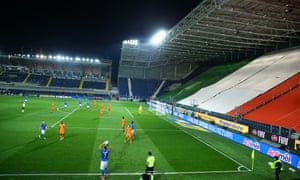There is a debate to be had over who is the real villain in the movie Jaws – the shark that patrols the waters off the resort of Amity devouring the appetising and unwitting, or Larry Vaughn, the wilfully myopic mayor who refuses to close the popular local beaches despite having been alerted to the predator’s presence. Following one such discussion on an episode of an American podcast, a listener felt compelled to contact the Jaws screenwriter, Carl Gottlieb, and the 82-year-old ventured the opinion that neither the maneater nor its human enabler were entirely blameless.
“Well, clearly the shark is the primary villain since he’s the one that actually bites people,” he opined. “But the mayor is a contributing villain because by his failure to take action and his denial, he puts more people in jeopardy and more people get killed.” Gottlieb went on to explain that Mayor Vaughn wasn’t entirely deserving of opprobrium because he was at least trying to serve the greater good in the face of totally “unpredictable uproar”.
You could conceivably say the same for the Uefa president, Aleksander Ceferin, and his executive committee, who moved with commendable speed to fall in line with several major European leagues who put their seasons on hold in March in an effort to halt the spread of coronavirus by postponing the Champions League and Europa League.
Despite later playing them out to a weird bio-hazardous conclusion in two mini-tournaments comprising one-leg ties played behind closed doors, the cost to Uefa in rebates to assorted broadcasters who did not get to show as many matches as they had paid for on the dates they had hoped was more than £500m.
It is small wonder, then, that as the virus continues to ravage Europe, with infection rates across the continent escalating at a greater rate than ever, there has not yet been the merest suggestion that the Champions League, a tournament reported to generate £4bn annually in revenue for Uefa, be postponed or cancelled.
On Saturday, our own answer to Mayor Vaughn finally announced that England would be going into what is tantamount to a second lockdown, following the lead of France, Germany, Belgium and Greece. Increased measures have also been announced in Spain and Italy, with other nations almost certain to follow suit.
Between them, the seven countries listed account for 21 of the 32 clubs in this season’s Champions League and are also well represented in the Europa League. Now in their group stages, the two competitions boast representatives from 40 countries across the length and breadth of a continent currently laid low by a highly contagious and deadly disease that shows no sign of abating.
In centuries to come (if we make it that far), students of history will have no shortage of detailed case studies to pore over as they struggle to come to terms with the mind-boggling ineptitude with which this pandemic has been handled by figures in authority who should have known better.
While fairly insignificant in the cosmic scheme of things, the staging of European tournaments that required 30- or 40-strong travelling parties from elite football clubs to regularly leave the relative safety of their own domestic bubbles to fly into others for no great reason other than financial box-ticking will be filed away in the extremely large cabinet marked “What the hell were they thinking?”

Even at the best of times, the group stages of the Champions League are monotonously predictable, with the richest clubs invariably making the knockout stages apart from odd, notable exceptions. Now played behind paywalls and closed doors, this season’s Champions League seems smothered in a fog of utter pointlessness and futility.
We are all familiar with those “special European nights at Anfield”, but let’s see how special it is when Liverpool have already qualified for the knockout stages of this year’s tournament with two games to spare and are hosting Ajax in a match no one is at and not many people can afford to watch from home on the first day of next month.
Still, come season’s end, a winner will be crowned amid a minimum of fanfare, prize money will be distributed, the record books filled in and Uefa will have turned another huge profit. Never before has football seemed so depressingly and slavishly beholden to the bottom line.
A high-profile player has yet to die because of the virus and it is to be hoped none will, but the pandemic has already contributed to more than its fair share of upheaval in the current season’s infancy. During the recent international break, when players were removed from their club bubbles, joined up with international teammates and flew across multiple borders in the space of 10 days before returning to their domestic duties, assorted teams were hit hard by the virus.
Last week, Covid saw to it that Lazio were forced to travel to Brussels with the bare bones of a squad that was subsequently put in quarantine before their weekend game against Torino. Should they be able to field a team, the Italian side must now travel to Saint Petersburg for Wednesday, where more than 18,000 positive Covid tests were recorded on Saturday. As sporting scenarios go, it seems irresponsible, feckless and downright bonkers.
“Six months ago everything was shutting down and now my friends, we are back,” announced Uefa’s president in September. “We cannot say everything is normal but it will be normal soon.” With the benefit of hindsight, Ceferin’s comments call to mind those of a certain movie politician. “It’s a beautiful day, the beaches are open and people are having a wonderful time,” Mayor Vaughn told concerned citizens. His bullishness would prove misguided too.
from Football | The Guardian https://ift.tt/3mLLRWa
via IFTTT

No Comment